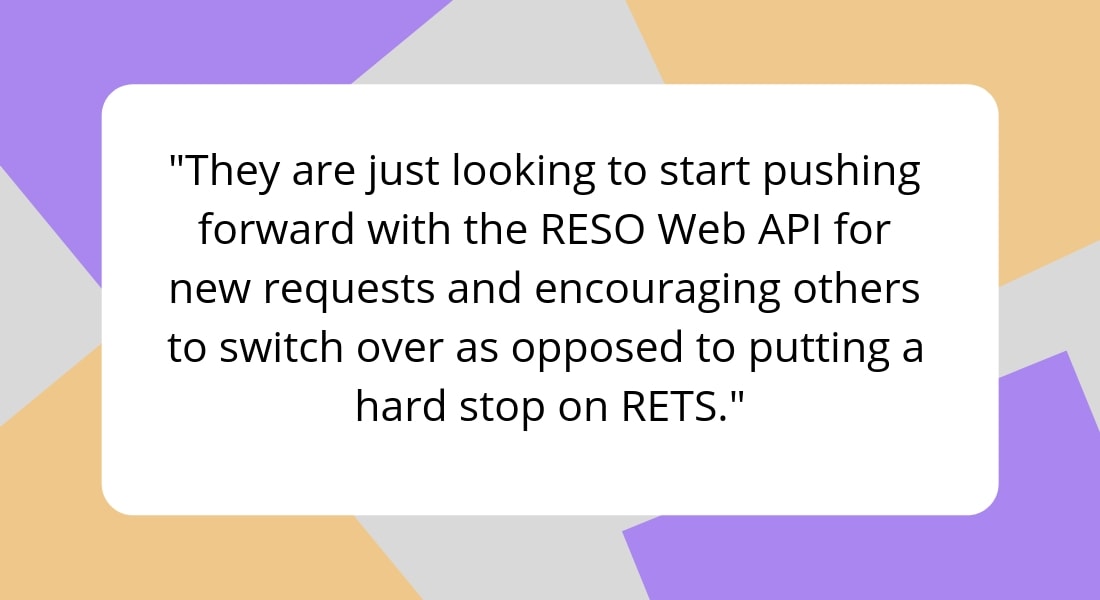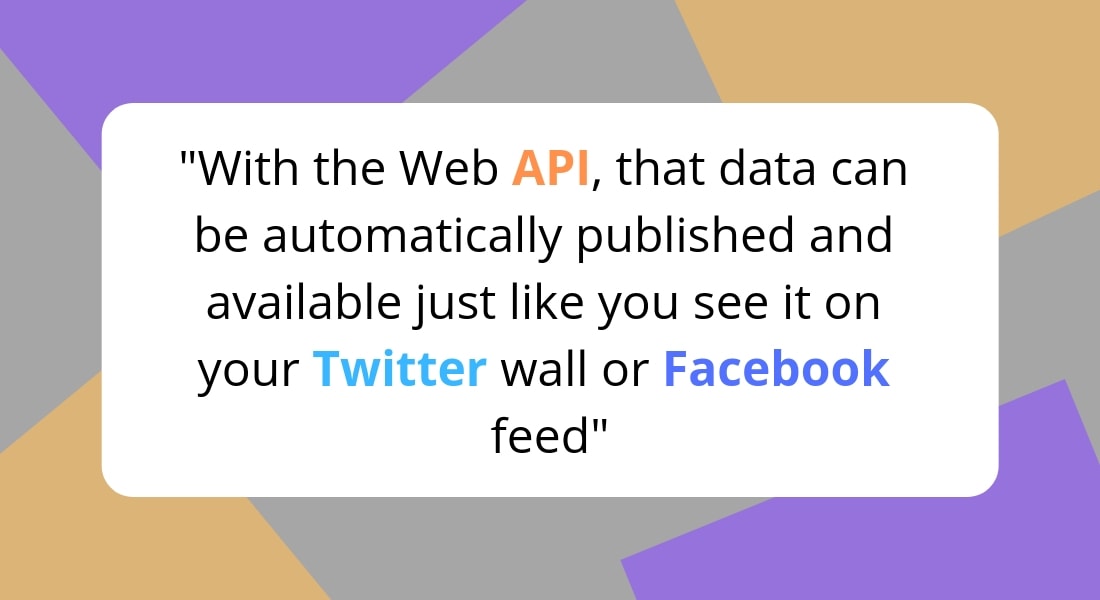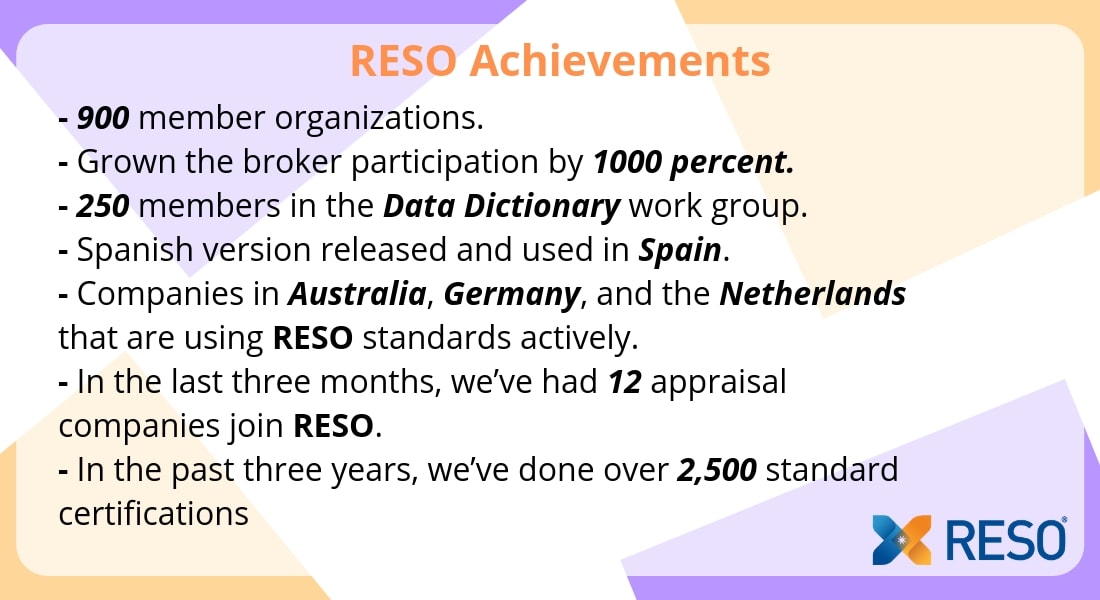On Jan. 6, Jeremy Crawford stepped down as RESO CEO to become CEO at the Atlanta-based First Multiple Listing Service. Before he left, he spoke with Realtyna on the phone about RESO Web API and the general direction of real estate technology. The following transcript has been lightly edited for clarity.
Realtyna: First of all, thank you for taking the time to speak with me and congratulations on the new position at FMLS.
Jeremy Crawford: Thank you.
R: Before you leave RESO, we want to ask about RESO Web API and the general direction of the industry. Our clients are always looking to stay on top of technological changes, so this is an important subject for them.
In 2016, you rolled out RESO Web API to MLSs and then last year you went a step further, setting a deadline for adoption of the new standard and ending the support for RETS. How has the transition been going from RETS to RESO Web API?
JC: Let me back up to be accurate. The RESO Web API specification was actually released much earlier than that. MLSs were to adopt the RESO Web API standard and provide it out to brokerages and data consumers at technology companies by June 2016. They extended the deadline to August 2016, so adopting the web API was required by MLS that are Realtorowned and affiliated by August 2016.
From an adoption perspective, there are close to 630-650 MLSs, depending on who is counting the MLSs and the type of MLS.
Almost all of those now have the Web API in place and available to those that qualify to receive data, such as brokerages and companies that build real estate products.
R: What are your thoughts on the pace of that transition counting the agents and brokers that are switching from RETS to RESO Web API?
JC: I will say that it depends on the type of company. To reflect upon the comments regarding RETS, we sunset the RETS working group in 2017 and 2018. We sunset the RETS certification to put emphasis on the RESO Web API and to shift RESO’s resources from MLSs adopting the API to brokerages and agents using the API.
I would say we are getting to a point where it depends on the environment of the entity. Startup companies—be it a start up brokerage or a startup technology company—they are very quick to adopt the RESO Web API. They don’t have as much infrastructure and research and development already set up with RETS.
Companies that have been using RETS for many years have infrastructure and investment. What we are seeing today is that they are starting to look at the benefits of the API, their current infrastructure, and how they can incorporate data into the RESO Web API.
You have some companies like Homes.com that aggregates over 500 data feeds and W+R studios that runs Cloud CMA. They have been at the forefront of trying to take the RETS infrastructure and move it over to the Web API. It is something that is a grassroots effort and it is a business decision, but we are seeing traction in the space.
The RESO Web API work group itself is working to develop FAQs, documentation, and alternative solutions for data replication for those that have been doing it historically via RETS. Having documentation and examples help the industry move forward.
When you consider RETS has been around for 20 years, it takes people a bit of time to look at moving to the RESO Web API. We don’t see MLSs turning the RETS feed off today. They definitely have not retired RETS. They are just looking to start pushing forward with the RESO Web API for new requests and encouraging others to switch over as opposed to putting a hard stop on RETS.
R: Lets go back to replication because you pointed out that the RESO Web API supports replication and non-replication of MLS data. Could you, for our clients, explain what this and why from their end they might choose one path or another?
JC: Yes, absolutely. Historically, RETS was built to copy data from an MLS to a brokerage back office system or a technology company that was doing IDX websites. RETS specification was built on the premise that it would actually copy the data.
The Web API leverages global technologies. In today’s world, instead of having dial up modems, where data is only available at a certain instance, you have high availability and cloud services. You have data that is always available in real time. So with the RESO Web API, you have the option to access that data on the fly for your real estate product as opposed to copying the data.
 A good example is if you are using a lightweight mobile app that does not display a lot of data and is used for search purposes. There is no need to replicate an MLS’ 5 million photos. The reality is that the photos can be fetched in the mobile app on the fly through the API in an efficient manner without having to copy that data to the technology company or brokerage’s infrastructure. They can leverage it on the wire. We see a lot of mobile app vendors and a lot of website companies leveraging the RESO Web API in a real time fashion.
A good example is if you are using a lightweight mobile app that does not display a lot of data and is used for search purposes. There is no need to replicate an MLS’ 5 million photos. The reality is that the photos can be fetched in the mobile app on the fly through the API in an efficient manner without having to copy that data to the technology company or brokerage’s infrastructure. They can leverage it on the wire. We see a lot of mobile app vendors and a lot of website companies leveraging the RESO Web API in a real time fashion.
From the stance of replication, there are big data analytics and statistical products. Those types of products still like to have a copy of the data to run analytics and create reports. Often times, you need the data in your own infrastructure to run things like machine learning, artificial intelligence, and statistical recording on massive sets of data. You can do economic trending in different parts of the state or region. Here, replication is still a valid use, so RESO Web API still supports that.
Not only does it support replication in the same manner that RETS did—that is time based—it also supports it with new technologies such as push, publish/subscribe, and queuing. It is more elegant in technology there.
Many start up companies do not want the overhead of maintaining datasets from hundreds of MLS nationwide. They would rather build their products to access this data live and not have to have the infrastructure in house. This helps them do that. There is a benefit to the API in leveraging more data in a real time environment without having to have the cost of that infrastructure in place.
R: RESO has said that the Web API makes everyone’s life simpler by reducing the time it takes for developers to implement software with the MLS Data. Could you fast-forward five years? How do you see these new efficiencies manifesting themselves in terms of products and the way homebuyers interact with MLS data?
JC: RETS was developed as a proprietary solution 20 years ago. Today’s world is a much more data-driven world in all of the economies that exist, not just real estate. The world is very data forward thinking, and there are global standards for efficiencies in accessing and transporting data.
Where RETS was created just for the real estate community before those global standards existed, the Web API actually leverages standards that have been created by companies like Oracle, FAP, Microsoft, Google, and so forth.
These standards are OData—managed by the OASIS standards body—and OpenID Connect, which almost everyone is familiar with. You do not know it, but when you log into Facebook, Google, Gmail, or Amazon, these are all using the open ID connect standard for authentication.
Five years from now, you will have what we look at as a plug-and-play environment. Leveraging the RESO Web API, you can grab tools that are readily based upon OData and OpenID Connect. In today’s world of RETS, you have to program that, and it is a very heavy custom development effort.
We see start up companies take two to three months to set up a data feeds with a handful of MLSs. If they leverage the RESO Web API and the Data Dictionary for the standard format of the data, you see those start up companies taking two to four weeks.
This is just the cusp. Five years from now, we would really like to have a plug-and-play environment, so that any innovative company out there can plug-and-play into MLS data and provide more data to consumers, like home energy data, in a more efficient manner and not have to spend so much money to build infrastructure or have the overhead of accessing data.
R: Thinking broadly there seems to be two paths here. There is standardization like the RESO Web API and Data Dictionary. Then, there is consolidation like Bright MLS and the RMLS Alliance. Both of these movements have advanced in recent years. Can you talk about these two movements within the real estate industry and how you see them interacting?
JC: Some actually ask the question won’t adopting RESO standards make it easier for me to be taken over by another MLS or association? My response to that is that, actually, not having standards in place is a pain point for the brokerage community. It also alleviates the pain point that is used in the conversation of mergers and acquisitions.
With that being said, when you have MLSs that adopt the RESO data dictionary and they have very similar field names and values you have the opportunity to make data mergers and data consolidations more efficient as well as regionalization efforts.
Coastal Carolina MLS, I think, is actually six to seven MLSs. They were able to retain their individual associations, but merge their MLS data by leveraging RESO standards. You have other efforts that are similar, such as the New York State Alliance of MLSs. Here you have multiple MLSs that participate in a coop of MLS data, and they are leveraging RESO data standards. They really compliment each other as it makes sense for an MLS to merge with another MLS or associations to form regional MLSs. It makes the data process and the technology process easier when those MLSs are using RESO standards.
There are other factors for consolidation, mergers, and acquisitions. Indiana Regional MLS is another prime example. It is a great MLS run by Carrie Kendall, and they have brought together associations that were very small and spread out across the state. Now they are within one common MLS database and they are more efficient in how they serve their agents and brokers with products and services, and they embrace RESO standards.
Where I am going in the future, FMLS, does data shares with Georgia MLS so that there is data consistency in the greater Georgia area for the consumer home buying experience. FMLS is a huge advocate and just converted their CoreLogicimplementation over to the Data Dictionary standard to make data sharing and data availability easier for their agents and brokers.
R: Getting back to the effects on agents, has any feedback from agents under MLS that have switched from RETS to RESO Web API filtered up to RESO?
JC: Oh Absolutely! We get contacted with questions on a daily basis. RESO Web API is still new, so there are still a lot of questions. There is a learning curve because it is a different technology being leveraged for data access. There are different methods needed to access data. There are some really cool methods to access data that were not available in RETS in how you ask for data. We get compliments on that.
We get suggestions for improvement in how we can do replication better. In the RETS world, you ask the database “give me all the listings that have changed every 15 minutes.” With the API, you have the MLSs publishing data like your Twitter feed or RSS feed. We do not think about that. That is actually a publish mentality.
I, with my Twitter account or my Facebook wall, I do not tell Facebook or Twitter to go get the Tweets from the last 15 minutes. That how RET’s works. It works well, but that’s how it works.
With the Web API, that data can be automatically published and available just like you see it on your Twitter wall or Facebook feed. So we get a lot of compliments, a lot of suggestions. Since the Web API is newer to a lot of people that are just now using it, we get a lot of technical support questions and how-to questions from brokers. Brokers are primarily the ones that are doing the data feed and products for their agents or the technology companies that are affiliated with them.

R: And what are you doing with the suggestions?
JC: We have a Web API work group. They meet on a monthly basis, but they also are meeting weekly to discuss specified topics. We also have a research and development work group.
[We have] 875 companies that are RESO members today. That covers over 1 million brokers and agents from brokermembership, over 1 million MLS subscribers from the MLS community, and hundreds of technology companies—large ones such as Realtor.com, Zilllow, CoreLogic, Back Knight, and dynaConnections that create MLS software and data distribution products, all the way to startup companies such as imbrex and reConsortia that are doing blockchain technology.
They bring their ideas and feedback into RESO and the research and development work group. If it is based on RESO Web API, it is moved over the RESO Web API work group. If it is something about data formatting, we move that over to the Data Dictionary work group.
We have our board of directors, which is comprised of 19 directors that cover large and small technology companies, MLSs, and brokers that all sit at the table together to make sure, strategically, everything being done is for the benefit of the broker community and to create a data environment to foster innovation. We have a very refined process for funneling all of the feedback we receive into to the 11 work groups and committees. They traditionally take a look, and then update and release specification on an annual basis as it relates to the API and the Data Dictionary.
For MLS that are Realtor owned and affiliated, for the good of community, the NAR quality says they have to adopt those updated standards within one year of the RESO board ratifying them. So we not only have a process for the standard, we also have support from NAR to ensure MLSs implement those standards.
R: So what is next for RESO? I read about an analytics standard for market intelligence and listing performance. Can you provide any more information about that?
JC: We have four efforts into that space, so we have a couple things there. We have an Internet tracking work group. Their goal is to provide standards that will be entered into the Data Dictionary format where you can leverage the RESO Web API so brokers have a consolidated view of the activity of their listings.
For example in today’s world, a broker may pay Realtor.com advertising, Zillow advertising, or Homes.com advertising to try to get their listings featured. We want to have a common solution so that that information of activity—was it shared on Facebook? Was it viewed? Was it searched for because it had a pool? Was it saved by the consumer?—all of that tracking information that those individual companies store will be able to use the RESO internet tracking standard fields and the Web API to transmit that so the broker can have a dashboard.
At the same time, the work group is also working on a standardized summary report, so MLS executives know the utilization of their products and services, and so they can better serve their brokers and agents. They can understand the products that they provide to agents. Are they using it? Are they using it efficiently? How does it compare to the suite of products they are using?
We also have distributed ledger work group that is working on event cataloging, which is similar to activities. They are looking at event cataloging over the lifespan of a property and what the industries are doing with blockchain technology. This not only concerns the industry as it relates to the listing side of the transaction,. This is where RESO is working with MISMO and mortgage, lending, and title companies to be able to expand our standards into those areas.
We just extended our membership categories for 2019 to bring in mortgage, lending, title, and appraisal organizations, so that we focus on the greater aspect of the transaction as opposed to just the MLS and listing side of the transaction.
Finally, we have a unique property ID work group that compliments all those efforts. They have a specification to uniquely identify every parcel in the United States that everyone can leverage, so they can get property history, build property events and activities, and de-duplicate properties if they are receiving them from multiple sources like many brokerages do across the nation.
R: And finally since today is, in fact, your last day, any thoughts on how you see your legacy at RESO?
JC: I am very excited to look back historically and see where I have brought RESO from a leadership perspective. I was the first W2 employee. We now have six employees. When I came on board we had 120 member organizations. We now have close to 900 member organizations.
We have grown the broker participation by 1000 percent. When I came on board, we did not have major broker representation at the board of directors. We have extended that, put them at the forefront, and I’m very proud of that. We only had five work groups and committees. We now have 11.
We have expanded our impact into new areas as you brought up earlier with Internet tracking. When I came on board, our Data Dictionary work group had 40 members. It has over 250 members that are subject matter experts today.

As I look back, I am super excited about the growth of RESO and I know that many in the industry have looked at me as being very passionate. Last year, I had 31 trips, 38 speaking engagements, including internationally. We have been able to get RESO standards used in other countries organically without policy mandates by NAR.
I am very excited to say that the Data Dictionary just released in December is now available in Spanish and being used in Spain. We have companies in Australia, Germany, and the Netherlands that are using RESO standards actively. I’m very excited about that expansion and looking forward to seeing that continue.
I’m excited to say in the last three months, we’ve had 12 appraisal companies join RESO. We are looking forward to having Fannie Mae, Freddie Mac, and Pitney Bowes, as well as Oracle, join RESO as members, and to continue a growing impact to help the mortgage community at the same time as helping the MLS community.
We do certification on our standards. In the past three years, we’ve done over 2,500 standard certifications between RETS, RESO Web API, and the Data Dictionary. For such a small staff, I’m extremely happy. I’m happy about how the industry has embraced implementing those standards, which allows us to do those certifications. It really takes a partnership.
R: Jeremy, thank you so much for your time today and good luck in your new role.
JC: You bet. Thank you so much, and I will continue to support RESO every way that I can.
For more on the RESO Web API, check out How Does the RESO Web API Work?
*post has been edited for Active Rain charater limit. You can view the complete interview here.


Comments (0)Subscribe to CommentsComment